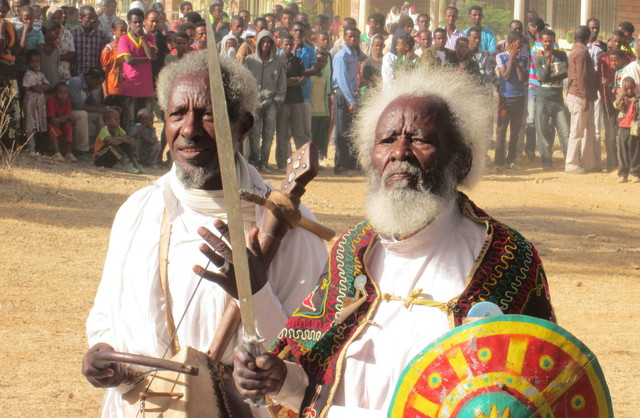 2014 marks the 118th anniversary of Ethiopia's victory at the Battle of Adwa on March 1st, 1896 and the following is a commemoration piece by historian Ayele Bekerie. (Courtesy Photograph: Adwa reenactment)
2014 marks the 118th anniversary of Ethiopia's victory at the Battle of Adwa on March 1st, 1896 and the following is a commemoration piece by historian Ayele Bekerie. (Courtesy Photograph: Adwa reenactment)
Tadias Magazine
By Ayele Bekerie, PhD
Published: Saturday, March 1st, 2014
Adwa, Ethiopia (TADIAS) — When historians recorded major world events of 1896 they included several headlines about the Battle of Adwa such as ‘Abyssinia (Ethiopia) Defeats Invading Italians’; ’80,000 Ethiopians Destroy 20,000 Italians at the Battle of Adwa’; ‘Italian Premier Crispi Resigns’; and ‘Abyssinia and Italy Sign Peace Treaty.’ In other words, Adwa was placed on the world map and remained a historic story because of Ethiopia’s decisive victory against the Italian army on March 1st 1896 (Yekatit 23, 1888 according to the Ethiopian calendar).
Adwa has generated a significant amount of discourse and prose from writers across the globe. To Raymond Jonas, Adwa is “the story of a world turned upside down.” As he further aptly puts it, “Ethiopia stunned the world.” Many writers made note of the fact that an African army defeated a European army. Donald Levine, the great Ethiopianist scholar, marked the historical event by highlighting its racial implications in reverse order: “a non-white nation has defeated a European power.” Levine’s perspective makes a whole lot of sense when one notices that it was also in 1896 that the US Supreme Court by seven-to-one majority vote affirmed racial segregation. And it took 58 years to overturn racial segregation in the United States.
Encyclopedia Britannica narrated the following about the event of Adwa for posterity: “ The decisive Ethiopian victory checked Italy’s attempt to build an empire in Africa.” British Prime Minister Sir Winston Churchill penned the event in these words: “On the 1st of March 1896, the Battle of Adwa was fought and Italy, at the hands of Abyssinia, sustained a crushing defeat. Two results followed which affected other nations. First, a great blow had been struck at European prestige in north [east] Africa. Second, the value of Italy as a factor in European politics was depreciated.”
In the context of world history, “the Battle of Adwa marked the largest military triumph of an African state over a European army in the nineteenth century and helped Ethiopia retain its independence during Europe’s Scramble for Africa,” writes Stanford University Historical Education Group. Ethiopia’s retention of its independence paved the way for global anti-colonial movements. Paul Henze describes it best when he states “the defeat at the Battle of Adwa as the beginning of the decline of Europe at the center of world politics.”
Film Director and Producer Haile Gerima, framed the event as follows: “The victory ignited a lasting flame of hope, of freedom and of independence in the hearts of Africans throughout the world.” Bahru Zewde, a distinguished historian, understood Adwa’s global historical significance, for it “brought Ethiopia to the attention of the world.” The leading Afrocentrist, Molefi Kete Asante, further reiterates: “After the victory over Italy in 1896, Ethiopia acquired a special importance in the eyes of Africans as the only surviving African state. After Adwa, Ethiopia became emblematic of African valor and resistance, the bastion of prestige and hope to thousands of Africans who were experiencing the full shock of European conquest and were beginning to search for an answer to the myth of African inferiority.”
In fact, in 1896, outside of Adwa, there was no good news from the continent of Africa. European colonizers were almost on the verge completing their colonial agenda everywhere. In 1896, France dismissed Queen Ranvalona and later annexed Madagascar to its vast colonial empire. British troops defeated Zanzibar in a 38-minute war — A battle that started at 9:02am and ended at 9:40am, the record shows. It is equally important to note the resistance against colonialism in 1896 as evidenced by the uprising of the Matebeles in what is now the nation of Zimbabwe.
When Adwa is studied and understood in the context of world history, we find Adwa as one of the most significant beacons of hope for all oppressed and colonized people of the world. It is a victory that shattered the myth of European supremacy. It is a global historic moment that should be remembered and its bigger story should be shared by young and old in the world. Adwa, we call again, for its inclusion in the World Heritage List.
—
Ayele Bekerie is an Associate Professor at the Department of History and Heritage Management at Mekelle University.
Related:
The Significance of the 1896 Battle of Adwa
Call for the Registry of Adwa as UNESCO World Heritage Site
Join the conversation on Twitter and Facebook.


























